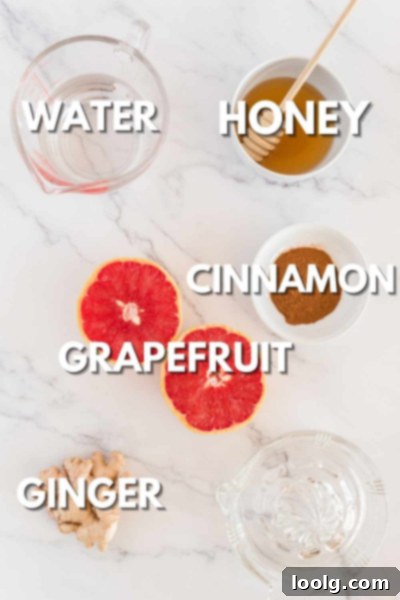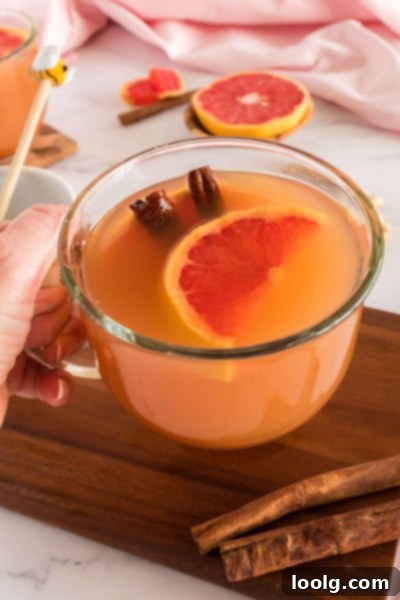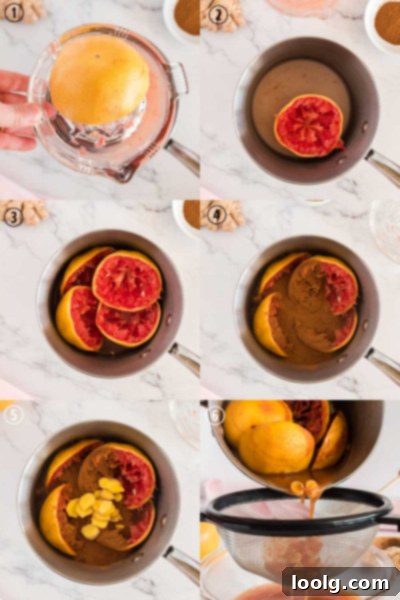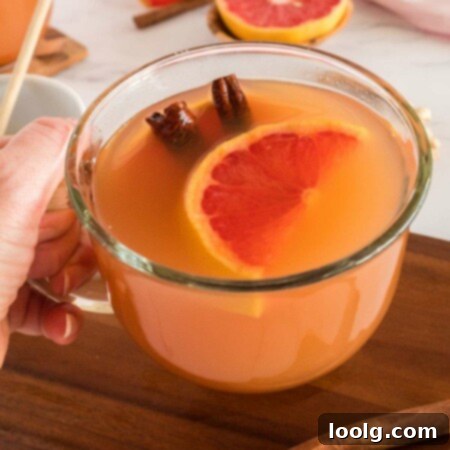Soothing Grapefruit Tea: A Natural Home Remedy for Cough & Immune Support
In the quest for natural wellness, especially during cold and flu season, finding effective home remedies can be a game-changer. This delightful grapefruit tea stands out as a truly wonderful solution for persistent coughs. It offers a warm, comforting embrace that helps to soothe your throat and ease respiratory discomfort. Sweetened with wholesome honey and infused with the aromatic flavors of fresh ginger and cinnamon, each ingredient is carefully chosen for its well-known cough-relieving and immune-boosting properties. Beyond its medicinal benefits, this tea is also completely paleo-friendly, making it a healthy choice for a wide range of dietary preferences.
Today, we’re diving into something a little different – a cherished home remedy that has become a staple in my household. Like many, I prefer to avoid trips to the doctor or reaching for over-the-counter medications unless absolutely necessary. My philosophy leans heavily towards natural solutions and traditional home remedies for minor ailments, reserving conventional medicine for when it’s truly indispensable.
It’s been a challenging few weeks, filled with the usual culprits of childhood illnesses and persistent colds that seem to circulate endlessly. If you, like us, have been battling or recovering from a cold, grappling with that annoying, seemingly never-ending cough, then this grapefruit tea is specifically for you. It’s a simple, yet powerful concoction designed to bring relief and comfort when you need it most.
And for those moments when you’re feeling perfectly healthy but still crave the vibrant, zesty taste of grapefruit, I highly recommend trying my Ginger and Brown Sugar Broiled Grapefruit – a delicious treat that celebrates this versatile fruit.

The Powerful Ingredients Behind This Immune-Boosting Tea
Every single ingredient in this grapefruit tea recipe has been intentionally selected not only for its efficacy in alleviating coughs but also for its remarkable ability to bolster the immune system. While this recipe provides a fantastic base, don’t hesitate to experiment with other spices or flavors if you feel inspired to personalize your brew!
It’s important to remember that while these natural ingredients offer significant symptomatic relief and immune support, they are not a cure for colds or coughs. Instead, they work synergistically to improve your overall comfort and help your body fight off illness more effectively.
Ginger: The Warming Anti-Inflammatory Hero
Fresh ginger is a true MVP in my kitchen, especially when I’m feeling under the weather. Its invigorating aroma and distinctive spicy kick are not just pleasant; I genuinely notice a positive difference in my well-being when I incorporate it into my remedies.
Renowned for its potent anti-inflammatory properties, ginger contains compounds that research suggests can help relax the membranes in our airways. This relaxation can significantly contribute to reducing the frequency and intensity of coughing fits, making it an invaluable ally against respiratory irritation. For best results, I always recommend fresh ginger over powdered, as it retains more of its volatile oils and therapeutic compounds.
Unless absolutely necessary, I urge you not to skip this ingredient. Feel free to add as much as your palate can comfortably handle. Keep in mind that ginger does impart a noticeable spiciness to the tea, so if you’re sensitive to heat, adjust the quantity accordingly to find your perfect balance.
If you find yourself with extra fresh ginger, consider using it in this refreshing Fresh Pineapple Ginger Juice – another fantastic pick-me-up when you’re on the road to recovery.
Cinnamon: The Soothing Spice for Congestion and Coughs
Beyond its warm, comforting aroma, cinnamon is celebrated for its ability to help alleviate various cold symptoms, including nasal congestion, persistent coughing, and general respiratory discomfort associated with infections. It’s a powerhouse spice that adds both flavor and therapeutic benefits to our tea.
When selecting cinnamon for remedies like this tea, I highly recommend opting for Ceylon cinnamon. While Cassia cinnamon, the more common variety found in most grocery stores, is perfectly fine for baking, Ceylon cinnamon offers a lighter, more delicate flavor and is generally preferred for medicinal purposes, especially when consumed in larger quantities or frequently.
I typically purchase Ceylon cinnamon in bulk online, as it can be a bit pricier than Cassia. However, buying a larger bag often reduces the cost per ounce, making it a more economical choice in the long run. The primary reason for this distinction is the coumarin content; Cassia cinnamon contains higher levels of coumarin, which can have adverse health effects if consumed in excessive amounts over time. In fact, just 1 teaspoon of Cassia could potentially put you over the daily tolerable limit, depending on your body weight. You can delve deeper into the potential side effects of cinnamon here to make an informed choice.

Honey: Nature’s Sweet Cough Suppressant
Honey is perhaps the most well-researched and widely accepted natural remedy for coughs, and for good reason. Its thick, soothing consistency coats the throat, providing immediate relief from irritation, while its natural antibacterial properties can aid in fighting off infections.
A critical warning: Honey should NEVER be given to children under 1 year of age due to the risk of infant botulism.
To truly harness honey’s full medicinal benefits, it’s crucial to use raw, unprocessed honey. Raw honey retains beneficial enzymes, antioxidants, and trace minerals that are often destroyed during pasteurization. To preserve these delicate compounds, avoid adding raw honey to excessively hot liquids.
In this particular recipe, you’ll prepare a grapefruit tea concentrate. Once the concentrate is removed from the heat and allowed to cool to a temperature below 95° F (35°C), you can then stir in the honey. This gentle temperature ensures that honey’s therapeutic properties remain intact. If you’re short on time and can’t wait for the concentrate to cool completely, an excellent alternative is to add the warm concentrate to your mug, dilute it with some room-temperature water, and then stir in your raw honey to taste. This method effectively cools the liquid before the honey is introduced.
Grapefruit: The Citrus Powerhouse for Sore Throats
Grapefruit juice offers more than just a tangy flavor; it can be incredibly helpful in relieving sore throats and calming irritating coughs. Rich in Vitamin C and antioxidants, grapefruit supports your immune system and helps to reduce inflammation. For the most potent benefits and freshest taste, I highly recommend using freshly squeezed grapefruit juice over bottled varieties, which often contain added sugars and lack the same nutritional vitality.
Got some grapefruit juice left over? While you’re on the mend, dream of healthier days and save it for a refreshing Grapefruit Paloma!
Grapefruit Peel: To Peel or Not To Peel?
When it comes to the flavor and effectiveness of this grapefruit tea, a key decision point is whether or not to include the grapefruit peel during brewing. You essentially have two paths to choose from.
From a purely taste perspective, I personally much prefer the tea made without the peel. The peel contains potent compounds, like naringin, which contribute to its medicinal efficacy but also impart a significant bitterness to the tea. Without the peel, the tea is considerably more palatable, allowing the vibrant citrus notes to blend harmoniously with the ginger and cinnamon.
However, from a “home remedy” standpoint, the tea is undoubtedly more potent and effective *with* the peel. The peel is where a concentration of beneficial compounds resides, making it a more powerful immune booster and cough soother. While some individuals might enjoy the distinct bitterness, many will find it quite intense and may need to add extra honey to balance the flavor. Even with added honey, the underlying bitterness from the peel will likely persist. If you’re curious about why certain compounds cause intense bitterness, you might find my post on walnut butter insightful.
If your goal is a simply delicious, comforting tea that also provides an immune boost, and you plan to sip it purely for pleasure, then omitting the grapefruit peel after juicing is the way to go. In this version, the grapefruit flavor is less dominant, creating a truly super tasty, cinnamon-forward drink that you’ll want to enjoy often.

Alternatives and Customization for Your Tea
Should grapefruit not be readily available, or if you’re looking to modify the flavor profile, there are excellent alternatives. You can easily substitute one large grapefruit with a lemon or one and a half lemons. Lemon is another citrus superstar, packed with Vitamin C and known for its soothing properties for coughs and sore throats. This substitution might also help to subtly reduce the overall bitterness, especially if you’re including the peel.
I’ve also heard wonderful things about fresh pineapple juice as a natural cough remedy, though I haven’t personally tried it in this specific tea. Pineapple contains bromelain, an enzyme with anti-inflammatory properties that can help break down mucus. Incorporating fresh pineapple juice into your mix could not only provide additional benefits but also naturally sweeten the tea and further mitigate any bitterness.
Remember, when you’re feeling unwell, staying hydrated is paramount. Don’t hesitate to dilute this concentrate much more than recommended if you prefer a milder taste or simply want to drink more fluids. Feel free to add as much or as little of the concentrate to your cup as you like, topping it off with hot water and extra honey to taste. Drink up and let the healing begin!
Important Health Warnings and Disclaimers!
As with any home remedy, it’s crucial to approach it with caution and common sense. If you are experiencing severe symptoms, a high fever, shortness of breath, or any concerning health issues, please do not hesitate to consult a medical professional. Home remedies can be incredibly supportive, but there are times when professional medical advice and prescription medication are absolutely necessary.

A particularly vital warning regarding grapefruit: Please be acutely aware that grapefruit can interact with a wide range of medications, potentially altering their effectiveness or causing adverse side effects. This interaction is not limited to serious conditions; it can affect common medications such as statins, blood pressure medications, antihistamines, certain anti-anxiety drugs, and even some over-the-counter allergy medicines. If you are currently taking *any* medication, it is imperative that you read this comprehensive list of grapefruit and medication interactions or, better yet, consult your doctor or pharmacist before consuming grapefruit or grapefruit products. Your health and safety are paramount.
That being said, assuming no medication interactions, I sincerely hope you’ll consider giving this wonderfully soothing tea a try the next time you’re plagued by a stubborn, nagging cough that just won’t quit. Perhaps even enhance its aromatic profile with a bit of homemade Rosemary Simple Syrup? Having experienced its profound effectiveness firsthand – a month-long cough completely vanishing after just two days of drinking one batch of this tea – it has undoubtedly earned a permanent spot in my wellness routine. I’ll be brewing this every time sickness strikes! I’m also eager to try this popular Starbucks Medicine Ball recipe for another comforting option.
Even if you’re feeling perfectly well, I wholeheartedly recommend preparing this grapefruit tea (without the peel for optimal taste) as a delicious and enjoyable way to proactively boost your immune system. It’s a flavorful tonic that your body will thank you for.
For more natural wellness solutions, you might also be interested in my recipe for Feel Better Green Juice, available right here on the blog. I can attest that it provides immense support when you’re feeling sluggish and need a revitalizing boost. And this vibrant Carrot Juice should also do the trick to keep you feeling great!

Grapefruit Tea – Home Cough Remedy
Author
Erin Dooner
4
servings
Prep Time
2 minutes
Cook Time
10 minutes
Total Time
12 minutes
Ingredients
-
2
large grapefruits -
1
tablespoon
ground cinnamon -
1
large knob of ginger, about 1″, thinly sliced -
1
cup
water -
1/4
cup
honey + more to serve
Instructions
-
Slice grapefruits in half and squeeze out as much juice as you can into a medium-sized pot. If you don’t mind quite a bit of bitterness and prefer maximum medicinal benefits, throw the squeezed out peels into the pot as well. If doing that, add about another cup of water. Add the cinnamon, sliced ginger and water.
-
Bring to a boil then turn down the heat and simmer for 10 minutes.
-
Remove from the heat and strain to remove the grapefruit peels (if using) and ginger. Let the concentrate cool to 95° F (35 °C) or lower before stirring in the honey (this is essential to preserve the beneficial enzymes and properties of raw honey). Alternatively, you can add the warm concentrate to a mug, top with room temperature water (which will cool down the tea concentrate), and then add your honey.
-
Store this concentrate in the fridge for up to 3-4 days. When ready to serve, add about a 1/4 of the concentrate to a large mug and top with hot water. Stir in more honey as needed to taste and enjoy the soothing relief. Feel better soon!
Tried this recipe?
Tag me today! Mention @easywholesome or tag #easywholesome!
